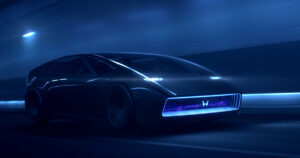
Future state: In-cabin tech to learn driver behavior, enhance experiences
By onTechnology
Vehicles of the future could use artificial intelligence (AI) to cultivate experiences beyond driving, such as activating a coffee maker at home when cameras notice the driver yawning.
Honda, Bosch and HCMF Group separately revealed they are working on connecting technologies to expand the driver’s experience during the 2024 Consumer Electronic Show (CES) last week.
Each appear to be years away from launching their options, but the intent to develop should potentially also inform on the access to vehicle-generated data.
Honda said a core value for their recently revealed Honda 0 Series will be providing an experience made possible by the Internet of Things (IoT) — the connection of technology with other technology via the Internet.
The 0 Series, an electric vehicle series, is planned for a 2026 launch. It was revealed at CES, along with multiple values the company intends to focus on for future generations of the car, including fully autonomous driving.
“Through IoT and connected technologies centered on Honda’s original vehicle OS, the Honda 0 Series models will aim to offer the value of ‘fun to drive, fun to use and fun to be connected,'” a press release states.
AI and big data will learn the owner’s preferences, such as music, driving behaviors, and tendencies, and make various suggestions, the release said. It also will provide information about the surrounding areas and give route guidance.
“The more people use their vehicle, the closer they become with their vehicle,” Honda Executive Vice President Shinji Aoyama told a CES crowd. “This makes it possible for the vehicle to offer the fun of being connected in various situations in people’s daily lives.”
Bosch announced point-of-interest assistance for cars that will use interior cameras to monitor the gaze of drivers. The technology is being developed in partnership with Amazon Web Services (AWS).
Wendy Bauer, AWS vice president and general manager of automotive and manufacturing, told an audience at CES that the assistant will give drivers information about particular restaurants or coffee shops it detects the driver looking at.
“You can ask your voice assistant if it is open and how busy it is without even mentioning the name of the place you are looking at,” Bauer said. “In real-time, it will let you know if it’s worth a shop or if you are better off stopping at another place along the route.”
The system could also notice the driver is tired and offer to have the driver’s Bosch coffee maker brew a cup to be waiting for the driver at home.
HCMF Group, a Tier 1 system supplier, also revealed transparent Micro LED displays that can slide up and down on rear seat side windows.
“This innovative feature opens up possibilities for in-vehicle information and entertainment content, online video conferencing, secure in-vehicle reminder image placement, and more, driving the future of smart mobility,” a press release said.
The technology raises concerns about privacy and questions about whether the systems would be used to advertise to consumers.
The book “zero dollar car” by John Ellis, found of Ellis & Associates and former Ford global technologist, theorizes the evolution and use of information collected by vehicle sensors and vehicle technology and the value and commercialization of the information to “companies that want to know more about you, and about people like you.”
Bosch used Alexa, made by Amazon, as an example of the technology that vehicles could use. A report published by the University of Washington, UC Davis, UC Irvine, and Northeastern University last year found Amazon used data collected by Alexa to track, profile, and target ads to consumers.
A Mozilla Foundation study published last year gave 25 auto brands, including Honda, failing marks for consumer privacy. Other brands included Mercedes-Benz, Nissan, BMW, Ford, Toyota, Tesla, Kia, Subaru, Chrysler, GMC, Cadillac, Dacia, Jeep, Lincoln, Acura, Fiat, Volkswagen, Dodge, Buick, Lexus, Audi, Chevrolet, Renault and Hyundai.
Researchers found data is gathered by sensors, microphones, cameras, and the phones and other devices drivers connect to their cars as well as through car apps, company websites, dealerships, and vehicle telematics. Brands can then share or sell the data to third parties. Based on its research, Mozilla says OEMs may also use the data to develop inferences about a driver’s intelligence, abilities, characteristics, preferences, and more.
Images
Photo of Honda’s Space-Hub vehicle in the Honda 0 Series. (Courtesy of Honda)
